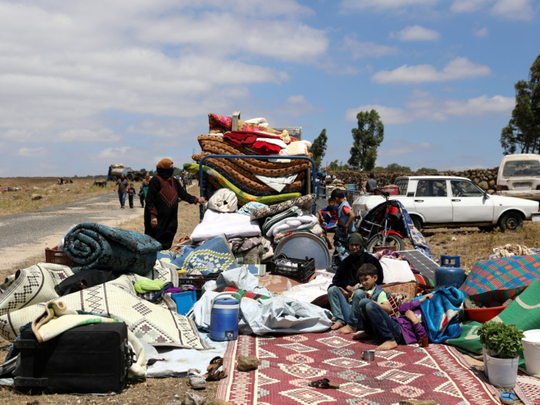
Thousands of families fleeing a Syrian government offensive in the southern city of Dara’a are currently stranded at the Jordanian border, unable to either return home or escape the violence because passageways to the neighboring country had been sealed.
The situation was quickly deteriorating at several spots along the border with no shelter, running water or sanitary facilities, according to aid organisations and activists in the area. Humanitarian organisations have called on Jordan to open the border to Syrians fleeing violence.
The new offensive by Syrian government forces aims to regain control of one of the country’s last two rebel-held territories.
- Karl Schembri| Middle East spokesman for the Norwegian Refugee Council
It has driven thousands from the city, which is just a few miles from a border crossing into Jordan.
But Jordan closed its border with Syria two years ago after a car bomb in June 2016 killed seven Jordanian border guards.
Jordan and Syria’s other neighbors, Lebanon and Turkey, have borne the brunt of the exodus of millions of refugees who have fled across the borders during the past seven years of war.
The conflict has displaced nearly 12 million people, more than half of Syria’s population.
Syrians are officially registered as refugees in Jordan
The host countries have long struggled with the physical and economic strains of providing for the needy population.
Jordan now hosts more than 660,000 Syrians officially registered as refugees, according to the UN refugee agency.
But Jordanian officials say the true number is much higher because there are hundreds of thousands more who are not registered.
The Jordanian prime minister’s office said Saturday that the armed forces would be delivering humanitarian aid to the Syrian side of the border, but it gave no indication that the border would open.
Without having access to the families gathered at the border, determining the extent of the need is impossible, said Karl Schembri, the Middle East spokesman for the Norwegian Refugee Council.
“The situation is really grim, and we know there are more people on the way,” Schembri, who is based in Amman, Jordan, said by phone.
“And we don’t know how close the fighting is going to get to them.”
Syrians displaced from Dara’a, according to a medical charity
Footage posted on social media by local activists in Dara’a purports to show crowds gathered at the border, chanting “Jordan, open the border,” as military vehicles patrolled in the background.
Local activists said at least five children died over the past week after being stung by scorpions and not having access to medical care.
The Union of Medical Care and Relief Organisations, a medical charity and advocacy group that operates in Dara’a, estimated Saturday that 217,000 people have been displaced from Dara’a and as many as 75,000 had gathered at the border with Jordan.
The United Nations gave a lower estimate Friday, saying that some 160,000 have been displaced by the fighting and those still in the area were becoming desperate.
“The humanitarian situation here is very difficult, it’s horrible,” said Baha Mahameed, a doctor with the medical care union in western Dara’a.
“The borders are still closed. This is madness.”
Late Friday, the UN secretary-general, Antonio Guterres, called for an end to the Syrian government offensive and said it was taking a devastating toll on civilians.
Syrians from Dara’a gathered at the border with Jordan
Residents of Jordan have also begun pressuring their government to open the border with Syria.
By Saturday, the Arabic phrase for “open the border” was trending on Twitter.
And Jordanian news outlets shared videos, reportedly taken in the border town of Ramtha, showing local residents gathering food and water for the Syrian refugees.
Ayman Safadi, Jordan’s foreign minister, met with Guterres on Friday to discuss the situation at the Syrian border.
After the meeting, Safadi said the focus should be on keeping Syrians safe within their own country.
“Before we talk about the expulsion of the Syrians from their land, we have to talk about protecting the Syrians there,” Safadi said on his official Twitter account after the meeting.
“We have to talk about creating international mechanisms to secure protection and to provide assistance to the Syrians on their land.”
Safadi also noted that Jordan, like many of the nations bordering Syria, had already received many of Syria’s millions of refugees. He noted that the priority was to help the warring parties reach a cease-fire agreement.
“We have opened our hearts, our homes and our schools to our Syrian brethren, and we are continuing to provide everything we can,” Safadi said.
He urged the international community to come to Jordan’s aid in assisting the displaced.
“Jordan cannot afford the consequences of the crisis alone. This is a responsibility of the international community.”












